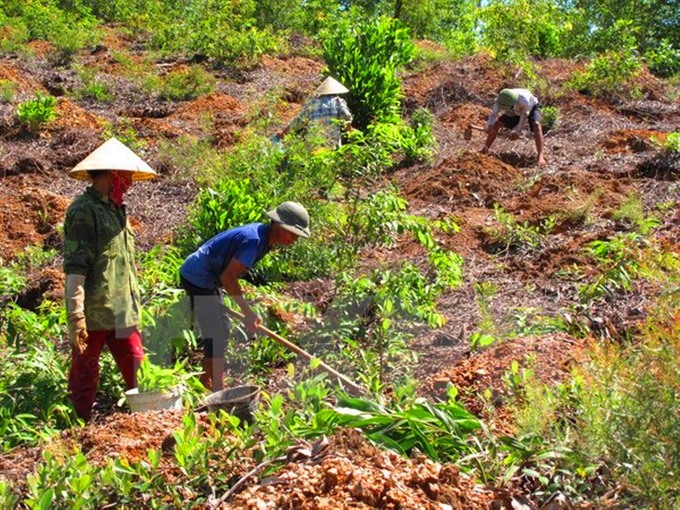 Society
Society

Re-allocation of State-owned forestry farms should be tightly controlled and supervised, and prolonged disputes must be settled, Trần Ngọc Bình, an expert from the Forestry Department of the Ministry of Agriculture and Rural Development (MARD) said at a seminar yesterday.
 |
| Forestry companies face difficulties in forest protection and production due to lack of proper policies and mechanisms.—VNA/VNS Photo |
HÀ NỘI – Re-allocation of State-owned forestry farms should be tightly controlled and supervised, and prolonged disputes must be settled, Trần Ngọc Bình, an expert from the Forestry Department of the Ministry of Agriculture and Rural Development (MARD) said at a seminar yesterday.
“Policies are needed to create jobs after re-organising farms to effectively implement sustainable poverty eradication,” he told the seminar jointly organised by the Ministry of Agriculture and Rural Development and the Forestry Land Alliance to discuss land management of agricultural and forestry companies.
Under a 2014 Government decree, many forest lands owned by companies and farms were handed over to local governments for re-allocation to poor households and ethnic minorities.
Since then, several studies have been carried out on supervising and evaluating the land re-allocation projects by local authorities.
According to Bình, 43 companies were authorised to maintain a State-owned model while two companies were allowed to shift to forest management boards in the form of profitable public agencies.
Along with achievements, the changes exposed shortcomings, Bình said. “Evaluation and re-allocation of forest lands in some localities has been slow,” he said. “The reasons were lack of finance, staff and involvement of concerned agencies,” he added.
In addition, land disputes and encroachment by local residents and companies are an ongoing problem, Bình told the seminar. In fact, forestry companies face difficulties in forest protection and production due to lack of proper policies and mechanisms.
Nguyễn Thanh Phong, an expert from the ministry’s Policy and Strategy Institute, said disputes and complaints were due to lack of full involvement by related parties, especially local governments and representatives of people’s committees.
Moreover, in many cases, parties did not fully understand policies, resulting in disputes over defining boundaries and allocating lands to households, said Phong.
Thus, a proper legal framework was needed for supervising the activities to avoid disputes and complaints and help poor people access natural resources equally and transparently in order to improve their lives and eradicate poverty, he said. – VNS




